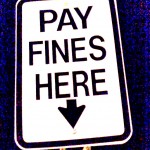One of the many things that fascinate me are fines. I’m referring to penalties, not “its all good.” Are they proportional? Is there a logic? Do they work?
When I was growing up, people used to go to the library (this dates me!). Typically the check-out period for a book was 30 days. If you kept the book longer than 30 days you had to pay a fine. As I remember it was something along the lines of a nickel per day. Those nickels added up quickly! Be late for a month and it would cost me a buck fifty which was about a third of my weekly allowance.
 As an adult, one of the fines I’ve paid most often is for parking where I shouldn’t have or longer than I was supposed to. Fines in the District of Columbia are not cheap. I think the last one I paid was $100. If you’re late they double. Rack a few of those up and you’re talking real money. Let’s say that you average a couple of parking fines a year. And you’re late on one of them. That’s $300. If you’re the average person with an average family income (which is $51,413), that’s about .6 percent of your income. Not much.
As an adult, one of the fines I’ve paid most often is for parking where I shouldn’t have or longer than I was supposed to. Fines in the District of Columbia are not cheap. I think the last one I paid was $100. If you’re late they double. Rack a few of those up and you’re talking real money. Let’s say that you average a couple of parking fines a year. And you’re late on one of them. That’s $300. If you’re the average person with an average family income (which is $51,413), that’s about .6 percent of your income. Not much.
I read yesterday that the FCC fined Google a whopping $25,000 for for impeding an investigation. It had something to do with Google collecting information without permission. I don’t know if the FCC was right in fining Google. And I don’t know if Google was really guilty of anything. But I’m thinking that Google doesn’t look at the FCC fine the same way I did my late library book fines or parking fines.
According to Gooogle Finance, Google has about $57 billion in the bank. But that’s not liquid assets that they can use to pay the FCC. No, their liquid assets (cash and equivalents) are only $23 billion. And now that I think of it that’s not the right measure either. When I paid library fines or parking fines, I didn’t pay them out of savings, I paid them out of income. So what is Google’s income? Well for the quarter ending in March 2011 net income was a paltry $3.5 billion.
So how does $25,000 stack up to $3.5 billion? By my math (and I had to search to find an online calculator that would go far enough in decimals to figure this out) it is .0007 percent. But that is over three months. The math gets a bit better if you look at it through the lens of monthly income. If we assume that Google’s net income is running about $1 billion a month (a bit more than my allowance growing up and slightly higher than the median family income) then they are making net about $33 million every day (this includes Saturdays and Sundays! … those Google people never stop working!). And assuming that these guys are working 24/7, then the math works out to $22,916 in net income – that is income after expenses and taxes – every minute.
So that’s the FCC fine. The government got sixty seconds of Google’s net profit.
So here’s the question. If the library only charged kids sixty seconds of their allowance after candy, soda, and music … if the DC parking authority only charged us sixty seconds of our income after taxes, rent, and food …
Do you think we’d ever bring back a book or pay a parking meter?
